Nervous Weakness Remedies: 5 Natural Treatments To Try
Prickles with pain could be signs of an underlying condition that needs your attention.

Image: Shutterstock

Trips and falls are an inescapable part of life. We just dust it off and get back up, but we don’t realize that sometimes it can cause more damage to our nerves than we know. This leads to a medical issue called nervous weakness. While resorting to medical treatments is the right thing to do, you can also opt for natural ways to treat nervous system problems. Before we delve into that, let us understand how the nervous system works.
The nervous system is how we perceive and interact with the world around us. It controls our senses, movements, and essential bodily functions by sending messages from the brain to the rest of the body. Sometimes, constant stress and physical trauma can lead to serious issues in the nervous system. It may even cause fatigue, uneasiness, dizziness, and heart palpitations. In this article, we explore some foods and exercises that can treat your nervous system problems. Check them out!!
In This Article
What Is Nervous Weakness?
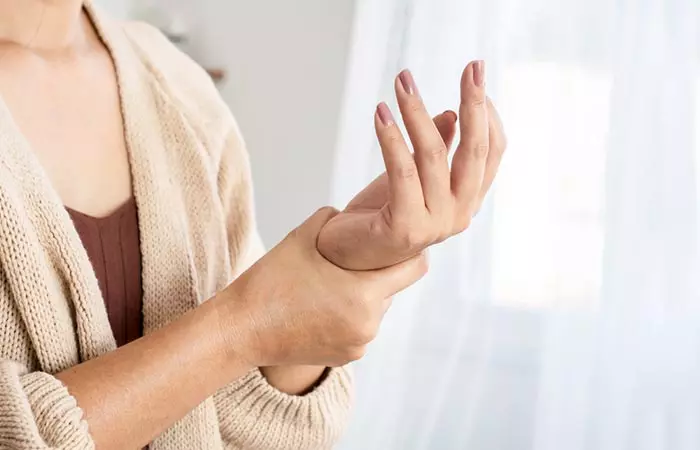
Nervous weakness or neuropathy is a medical term used to collectively define various nervous disorders that cause the nerves in some parts of your body to become weak or immobile. For some individuals, this condition is a temporary affair, while for others, it might be a permanent health issue.
Key Takeaways
- Degenerated nerves, stress, and an unhealthy lifestyle are some of the causes of nervous weakness.
- Ayurvedic massages, salt baths, and supplements may help manage this.
- Including your diet with vitamins, minerals, and herbal teas may help fasten the healing process.
- Practicing yoga asanas may also help treat the nerves effectively.
What Causes Nervous Weakness?
The most common causes of nervous weakness are:
- Inflamed nerves
- Compressed nerves
- Nerve damage
- Degenerated nerves
- Development of malignant tumorsi Cancerous cells that develop out of control and spread through the blood to nearby or distant parts of the body. on nerve cells
- Disruption of nerve impulses by toxins
- Unhealthy diet and lifestyle
- Stress
The causes of nervous weakness can also vary depending on the type of disease and other factors. They include:
- Nerve infections caused by bacteria, viruses, or other parasites.
- Medications or drugs that damage the nerves or alter their function over time.
- Deficiency of nutrients.
- Congenital defectsi Functional or structural anomalies that develop prenatally and can be identified before or after birth. or genetic abnormalities that alter the function of the nerves.
The symptoms of nervous weakness vary widely depending on the type and location of the affected nerve. Some common symptoms are listed below.
Signs And Symptoms Of Nervous Weakness
- Prickling or tickling sensation
- Aches or pains
- Anxiety and depression
- Weak immunity
- Fatigue
- Diminished sense of smell, vision, taste, touch, or hearing
- Cognitive problems
- Muscle weakness and wasting
- Tremors
Weak or damaged nerves can also give rise to different medical conditions, and some of the most common ones are discussed below.
List Of Nervous System Diseases
There are a number of diseases that can cause your nerves to weaken. They include:
- Sciatica: Sciatica is often a result of nerve root compression (1).
- Multiple Sclerosis: This is an autoimmune disease that causes the immune system to attack the insulating sheath (myelin sheath) of the nerves (2).
- Bell’s Palsy: Also referred to as facial palsy, this disease results in inflamed nerves on one side of the face, thereby causing muscle weakness in the affected area (3).
- Diabetic Neuropathy: This condition is a result of long and untreated cases of diabetes mellitus (4).
- Stroke: When a part of the brain tissues develops a blood clot due to an interrupted blood supply, it leads to a stroke (5).
- Parkinson’s Disease: This is a neurodegenerative disorderi A condition characterized by the breakdown of cells in the nervous system that can affect functions like balance, mobility, speech, etc. that leads to a gradual loss of certain types of nerve cells in the brain (6).
Nervous weakness might lead to a host of medical conditions. Hence, it is best to treat it immediately. Given below are natural remedies, foods, and exercises that can help you deal with nervous weakness.
Natural Therapies For Nervous Weakness
- Ayurvedic Oil Massage
- Epsom Salt
- Ashwagandha
- Water Therapy
- Sunlight
1. Ayurvedic Oil Massage

Ayurvedic massages are a well-known treatment for various ailments, including nervous weakness. This traditional treatment may help in rejuvenating your body and mind and ensures that your nervous system is healthy and active (7).
You Will Need
Almond or sesame oil
What You Have To Do
- Take a sufficient amount of almond or sesame oil and warm it a little.
- Massage the warm oil on your body or hire a professional to do it.
- Leave it on for half an hour before going ahead with your regular bath.
How Often You Should Do This
You can do this daily.
 Quick Tip
Quick Tip2. Epsom Salt
Epsom salt baths are most commonly used to relieve pain and inflammation of the muscles(8)
. The magnesium in Epsom salt plays an important role in nerve transmission and neuromuscular coordination (9).
You Will Need
- 1 cup of Epsom salt
- Water
What You Have To Do
- Add a cup of Epsom salt to your bathwater.
- Soak in it for 15 to 20 minutes.
How Often You Should Do This
Do this at least three times a week.
3. Ashwagandha

Ashwagandha has a range of benefits. It relieves stress and anxiety – two of the many symptoms of nervous weakness (10), (11).
You Will Need
Ashwagandha supplements
What You Have To Do
Take ashwagandha supplements in the dosage recommended by your doctor.
How Often You Should Do This
As recommended by the doctor.
4. Water Therapy
Water therapy is extensively used for relieving pain and inflammation and is an excellent treatment for nervous weakness. Alternating cold and hot water help reduce the pain and inflammation that occur due to weak or damaged nerves (12).
You Will Need
Cold and warm water
What You Have To Do
- End your usual bath with a short cold shower.
- Alternatively, take a clean washcloth and soak it in cold water. Rub this cold washcloth all over your body and pat dry.
- You can also alternate between warm and cold water for your bath. Ensure the final rinse is with cold water.
How Often You Should Do This
Do this daily.
5. Sunlight
Exposing yourself to the early morning sun rays is another way to treat nervous weakness. Nervous weakness is often associated with vitamin D deficiency, and the sun rays help your body produce more vitamin D (13).
Caution
Avoid going out in the sun in the afternoon for long hours, as this may have adverse effects on your health (14).
Ann, a blogger who shares encouraging life experiences, reflects on the positive effects of sunlight, stating, “As the light warmed my skin and the breeze cooled it down, I felt my anxiety melt away. My muscles relaxed. My mind quieted (i).”
Best Foods For Nervous Weakness
- Vitamins
- Magnesium
- Omega-3 Fatty Acids
- Chamomile Tea
- Green Tea
1. Vitamins
Consuming foods rich in vitamins B and D is another way to maintain the healthy functioning of your nervous system. Both the vitamins have anti-inflammatory properties that can help reduce inflammation within your body (15), (16). Vitamin D is also beneficial for bone health as it promotes the absorption of calcium by your body. You can consume foods like fish, bread, whole grains, vegetables, brown rice, cheese, and egg yolk to combat any deficiencies in these vitamins naturally. You can also opt for additional supplements of these vitamins, but after consulting your physician.
2. Magnesium
Magnesium is another important nutrient for a healthy nervous system (17). It exhibits anti-inflammatory properties that can help relieve nerve inflammation. It also promotes the production of serotonini A neurotransmitter essential for bodily processes like mood stabilization, sleep, wound healing, and blood clotting. to relax your nervous system.
Consuming magnesium-rich foods like dark chocolates, green and leafy veggies, bananas, and apricots is a great way to counter any deficiencies of this mineral naturally.
3. Omega-3 Fatty Acids
Omega-3 fatty acids are polyunsaturated fatty acids that are a boon for your nervous system (18), (19). Due to their anti-inflammatory properties, omega-3s can aid the treatment of various nervous system diseases by speeding up the recovery of weak and damaged nerves.
Consuming seafood like mackerel, oysters, sardines, salmon, and tuna is a great way to increase your intake of omega-3 fatty acids naturally. Opt for wild-caught fish, and be wary of the fact that seafood may contain heavy metals. You can also consider taking additional supplements after consulting your physician.
4. Chamomile Tea
Chamomile tea acts as a sedative, reduces anxiety, and calms down your nerves (20). It also has anti-inflammatory properties that can help in the treatment of damaged or injured nerves.
You Will Need
- 1-2 teaspoons of dried chamomile herb
- 1 cup of water
- Honey to taste
What You Have To Do
- Add a teaspoon or two of dried chamomile herb to a cup of water.
- Bring this to a boil in a saucepan and steep for about 5 minutes.
- Strain and allow the tea to cool before adding some honey.
- Consume it.
How Often You Should Do This
Drink chamomile tea 3 to 4 times daily.
5. Green Tea
Among the many benefits of green tea, one is its ability to promote a healthy nervous system. This is mainly due to the presence of compounds like L-theanine, which is known to have unique brain-boosting properties (21). These properties of green tea also help in managing depression, tension, anxiety, and stress-related disorders (22).
You Will Need
- 1 green tea bag
- 1 cup of hot water
- Honey
What You Have To Do
- Steep a green tea bag in a cup of hot water for 5 to 10 minutes.
- Let it cool a bit and add honey.
- Sip on it.
How Often You Should Do This
Do this three times daily.
Best Exercises To Help Nervous Weakness
- Yoga
- Walking Barefoot
- Deep Breathing
1. Yoga
a. Sarva Hita Asana
This yoga asana has a calming effect on your nerves and helps in harmonizing your breath.
Repetitions
5 times
b. Shashankasana
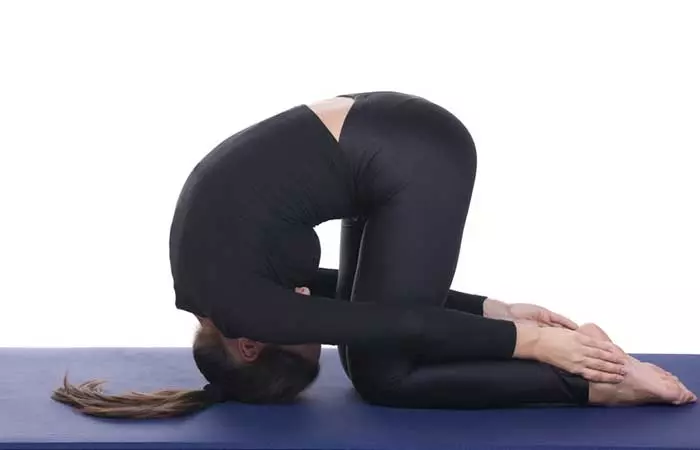
Shashankasana improves blood circulation to your head and promotes the functioning of your brain and eyes.
Repetitions
3 to 4 times
 Quick Tip
Quick Tipc. Khatu Pranam

This asana strengthens your spine and muscles and improves blood circulation to your head. This, in turn, assures the healthy functioning of your nervous system.
Repetitions
4 to 6 times
2. Walking Barefoot
Walking barefoot on moist earth or a sandy beach can help in healing your nervous system. It is believed that the electrons from the earth’s surface improve your health by reducing your stress levels and inflammation in your body (23).
Duration
30 minutes
3. Deep Breathing
You can also practice deep breathing to relieve stress and relax. It helps manage anxiety, fear, trembling, shaking and other stress-related disorders and improves your body’s natural healing abilities.
Duration
5 to 10 minutes
Repetitions
2 to 3
In addition to the remedies, diets, and exercises, here are some tips to help you deal with weak nerves.
Note: Consult healthcare providers for personalized treatment options tailored to your specific condition. A medical professional can diagnose the underlying cause of your symptoms and recommend appropriate treatments, which may include:
- Prescription drugs to manage pain and inflammation.
- Exercises and stretches to improve mobility and reduce pain.
- In severe cases, surgical procedures may be necessary.
Remember, it’s always best to seek professional medical advice before starting any new treatment or making significant changes to your lifestyle. This caution can help you avoid potential risks and ensure you’re making the best decisions for your health.
Check out our next section, which will explain how you can prevent nervous weakness and lead a healthy life.
Preventive Tips
- Quit smoking and using tobacco products.
- Make sure to get plenty of rest to avoid exhaustion.
- Treat and manage other medical conditions (if any).
- Drink a lot of fluids and water to replace fluid loss due to sweat production.
- Avoid alcohol and recreational drugs.
- Increase your attention span and ability to focus by learning new skills.
- Try and avoid the use of non-prescription medications.
Infographic: 5 Alternative Therapies To Relieve Nervous Weakness
Nervous weakness is caused due to damage to one or a bundle of nerves and inhibits communication between the brain and other parts of the body. This can lead to numbness and pain in the arms and legs and can weaken the muscles. It is best to consult a doctor and take medication, follow a strict diet, and exercise regularly to get relief from the pain. Along with that, you can also try alternative therapies to help you better deal with nervous weakness. Check out the infographic below to learn more.
Some thing wrong with infographic shortcode. please verify shortcode syntax
Nervous weakness refers to a variety of issues related to the nervous system that render some parts of the body immobile or weak. Inflamed or compressed nerves, nerve damage, stress, nutritional deficiencies, genetic abnormalities, etc., are some common causes of nervous weakness or neuropathy. Besides symptoms like random aches and pains, numbing sensations, tingling in hands and feet, a weakened immunity, tremors, cognitive issues, muscle weakness, and depression, nervous weakness can also manifest in certain systemic diseases. Address nervous issues as early as detected and work with a medical practitioner. Home remedies like Epsom salt, ayurvedic oil massage, ashwagandha, and water therapy can help manage the symptoms along with certain exercises and specific foods as discussed in the article.
Frequently Asked Questions
Can B12 repair nerve damage?
According to a study, Vitamin B12 can repair nerve damage (24). Vitamin B12 can be found in large amounts in eggs, poultry, dairy products, and meats, but not in plant products.
Is garlic good for nerves?
According to animal studies, the antioxidants in garlic are responsible for its neuroprotective properties and may help lower the risk of dementia and Alzheimer’s disease (25). However, further human studies are required to establish this claim.
How long does it take to recover from nervous weakness?
Nerves take time to recover. They may take months or even several years. If it is caused by some other medical condition, then the recovery depends on the treatment of that underlying condition.
Can nervous weakness lead to more serious conditions?
Yes, nervous weakness may lead to more serious issues like infections and functional disorders. Polio, meningitis, encephalitis, and epilepsy are a few conditions that may be caused due to nervous weakness.
When should I seek professional help for nervous weakness?
It is best to seek professional help as soon as possible. Consult a neurologist if you experience the symptoms mentioned in the article. It will help address the issues before it gets complicated.
Illustration: How To Treat Nervous Weakness Naturally - 5 Home Remedies
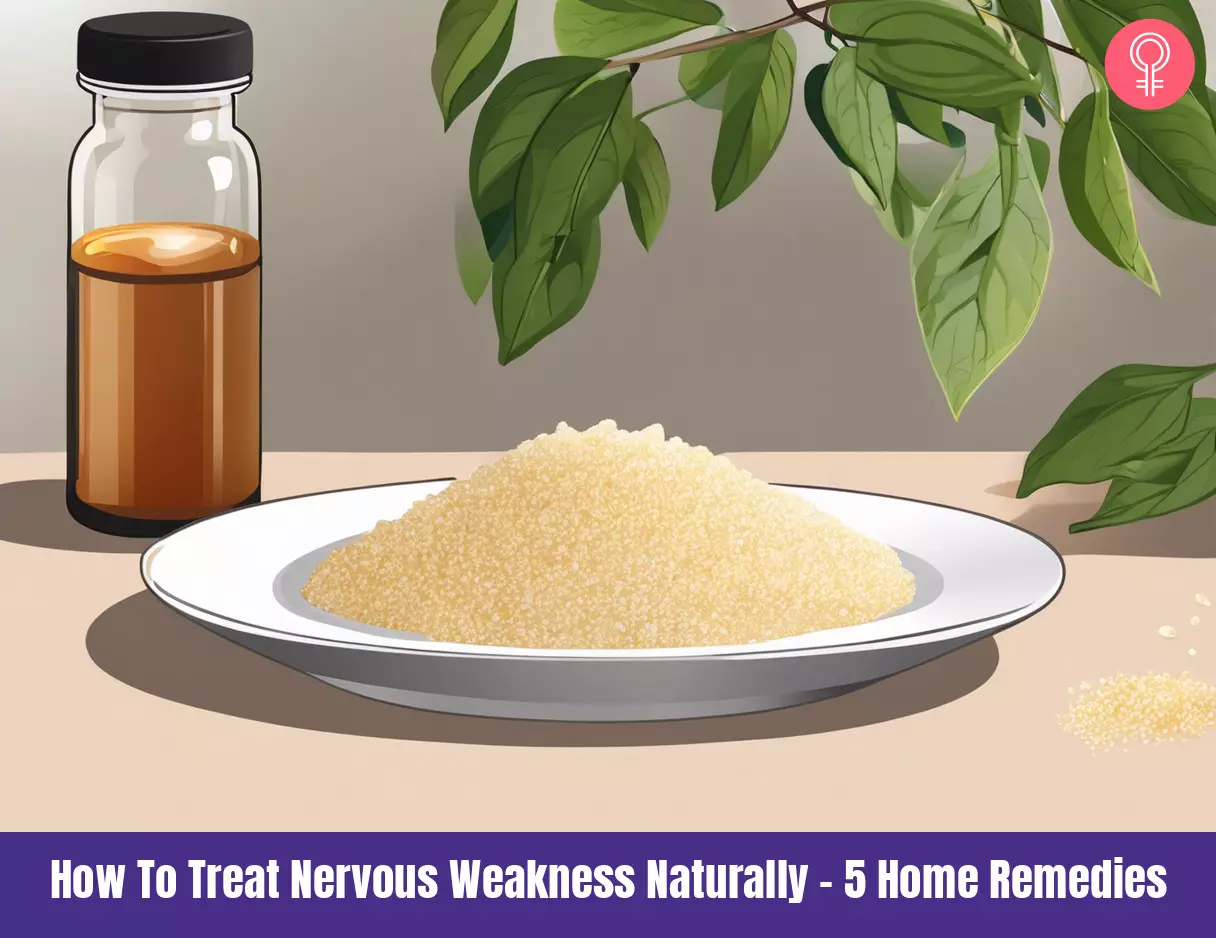
Image: Stable Diffusion/StyleCraze Design Team
References
Articles on StyleCraze are backed by verified information from peer-reviewed and academic research papers, reputed organizations, research institutions, and medical associations to ensure accuracy and relevance. Read our editorial policy to learn more.
- Diagnosis and treatment of sciatica, British Medical Journal, US National Library of Medicine, National Institutes of Health.
https://www.ncbi.nlm.nih.gov/pmc/articles/PMC1895638/ - Multiple Sclerosis: Pathogenesis, Symptoms, Diagnoses and Cell-Based Therapy, Cell Journal, US National Library of Medicine, National Institutes of Health.
https://www.ncbi.nlm.nih.gov/pmc/articles/PMC5241505/ - Management of Bell’s palsy, Australian Prescriber, US National Library of Medicine, National Institutes of Health.
https://www.ncbi.nlm.nih.gov/pmc/articles/PMC5478391/ - Diabetic neuropathy, Postgraduate Medical Journal, US National Library of Medicine, National Institutes of Health.
https://www.ncbi.nlm.nih.gov/pmc/articles/PMC2596705/ - Acute Stroke (Cerebrovascular Accident), StatPearls, US National Library of Medicine, National Institutes of Health.
https://www.ncbi.nlm.nih.gov/books/NBK535369/ - Parkinson’s Disease and Its Management, Pharmacy & Therapeutics, US National Library of Medicine, National Institutes of Health.
https://www.ncbi.nlm.nih.gov/pmc/articles/PMC4517533/ - Pilot study investigating the effects of Ayurvedic Abhyanga massage on subjective stress experience, Journal of Alternative and Complementary Medicine, US National Library of Medicine, National Institutes of Health.
https://pubmed.ncbi.nlm.nih.gov/21568717/ - The use of Epsom salts, historically considered, Canadian Medical Association Journal, US National Library of Medicine, National Institutes of Health.
https://www.ncbi.nlm.nih.gov/pmc/articles/PMC1584988/ - The Role of Magnesium in Neurological Disorders, Nutrients, US National Library of Medicine, National Institutes of Health.
https://www.ncbi.nlm.nih.gov/pmc/articles/PMC6024559/ - An Overview on Ashwagandha: A Rasayana (Rejuvenator) of Ayurveda, African Journal of Traditional, Complementary and Alternative Medicines, US National Library of Medicine, National Institutes of Health.
https://www.ncbi.nlm.nih.gov/pmc/articles/PMC3884513/ - A prospective, randomized double-blind, placebo-controlled study of safety and efficacy of a high-concentration full-spectrum extract of ashwagandha root in reducing stress and anxiety in adults. Indian Journal of Psychological Medicine, US National Library of Medicine, National Institutes of Health.
https://pubmed.ncbi.nlm.nih.gov/23439798/ - Scientific Evidence-Based Effects of Hydrotherapy on Various Systems of the Body, North American Journal of Medical Sciences, US National Library of Medicine, National Institutes of Health.
https://www.ncbi.nlm.nih.gov/pmc/articles/PMC4049052/ - Vitamin D: The “sunshine” vitamin, Journal of Pharmacology & Pharmacotherapeutics, US National Library of Medicine, National Institutes of Health.
https://www.ncbi.nlm.nih.gov/pmc/articles/PMC3356951/ - At what time should one go out in the sun? Advances in Experimental Medicine and Biology, US National Library of Medicine, National Institutes of Health.
https://pubmed.ncbi.nlm.nih.gov/18348449/ - Vitamin D and the central nervous system. Pharmacological Reports, US National Library of Medicine, National Institutes of Health.
https://pubmed.ncbi.nlm.nih.gov/23744412/ - Vitamin B12, folic acid, and the nervous system, Lancet Neurology, US National Library of Medicine, National Institutes of Health.
https://pubmed.ncbi.nlm.nih.gov/17052662/ - Magnesium in Prevention and Therapy, Nutrients, US National Library of Medicine, National Institutes of Health.
https://www.ncbi.nlm.nih.gov/pmc/articles/PMC4586582/ - The effect of omega-3 fatty acids on central nervous system remyelination in fat-1 mice, BMC Neuroscience, US National Library of Medicine, National Institutes of Health.
https://www.ncbi.nlm.nih.gov/pmc/articles/PMC5259863/ - Omega-3 Fatty Acids and their Role in Central Nervous System – A Review, Current Medicinal Chemistry, US National Library of Medicine, National Institutes of Health.
https://pubmed.ncbi.nlm.nih.gov/26795198/ - Chamomile (Matricaria recutita) May Have Antidepressant Activity in Anxious Depressed Humans – An Exploratory Study, Alternative Therapies in Health and Medicine, US National Library of Medicine, National Institutes of Health.
https://www.ncbi.nlm.nih.gov/pmc/articles/PMC3600408/ - L-Theanine reduces psychological and physiological stress responses. Biological Psychology, US National Library of Medicine, National Institutes of Health.
https://pubmed.ncbi.nlm.nih.gov/16930802/ - Reduced Stress and Improved Sleep Quality Caused by Green Tea Are Associated with a Reduced Caffeine Content, Nutrients, US National Library of Medicine, National Institutes of Health.
https://www.ncbi.nlm.nih.gov/pmc/articles/PMC5537891/ - Earthing: Health Implications of Reconnecting the Human Body to the Earth’s Surface Electrons, International Journal of Environmental Research and Public Health, US National Library of Medicine, National Institutes of Health.
https://www.ncbi.nlm.nih.gov/pmc/articles/PMC3265077/ - Vitamin B12 Enhances Nerve Repair and Improves Functional Recovery After Traumatic Brain Injury by Inhibiting ER Stress-Induced Neuron Injury
https://www.ncbi.nlm.nih.gov/pmc/articles/PMC6491933/ - Neuroprotective Effects of Garlic A Review
https://www.ncbi.nlm.nih.gov/pmc/articles/PMC3074326/
Read full bio of Caroline Duncan
Read full bio of Shaheen Naser
Read full bio of Ravi Teja Tadimalla
Read full bio of Dipti Sharma








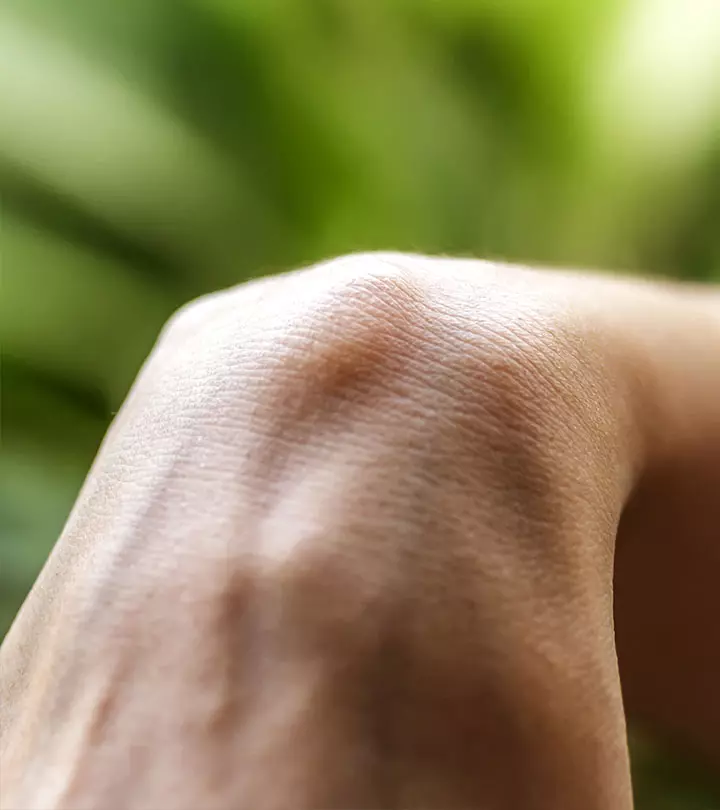




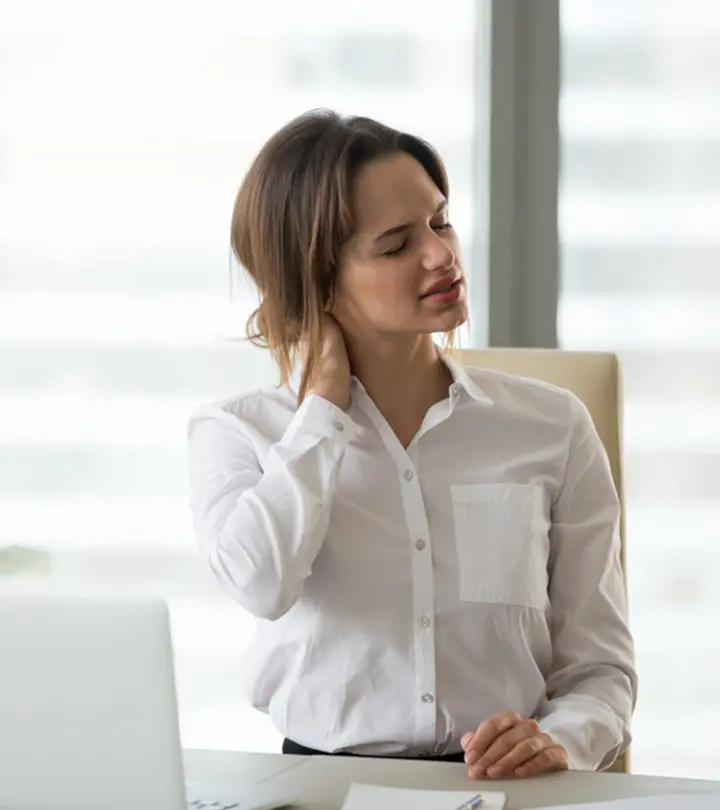









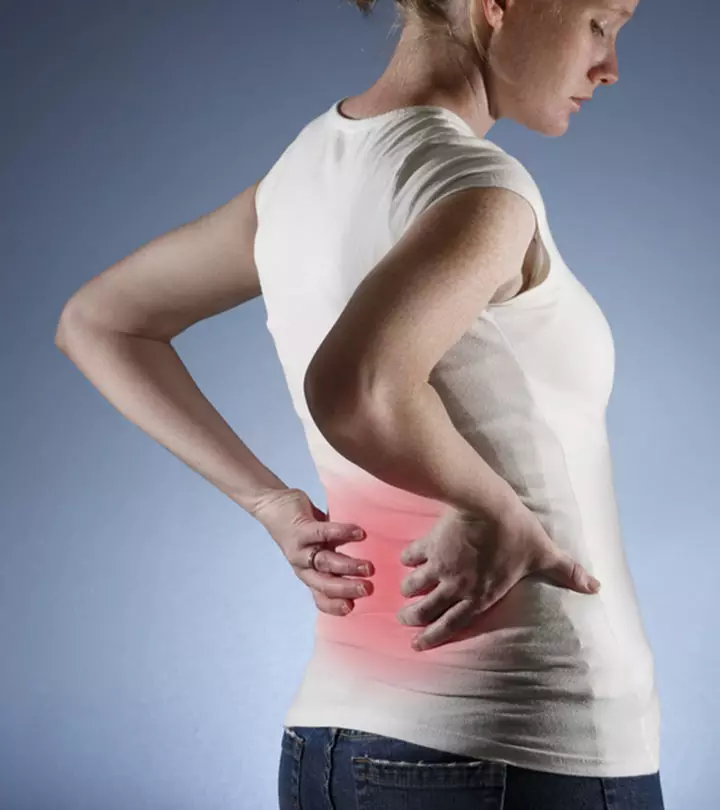
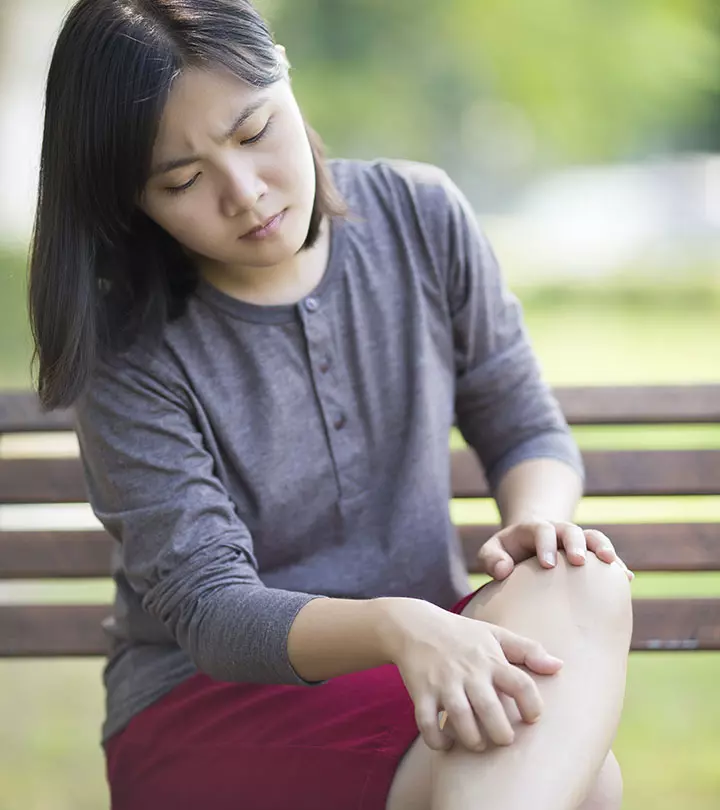
Community Experiences
Join the conversation and become a part of our empowering community! Share your stories, experiences, and insights to connect with other beauty, lifestyle, and health enthusiasts.